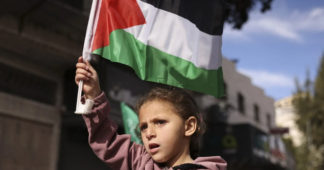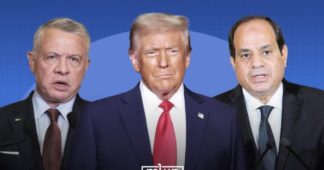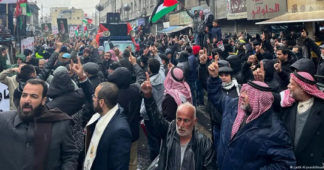Haaretz | Opinion
King Abdullah II became both the first Arab leader to meet with U.S. President Trump, and the first to directly reject his proposal to relocate Gaza’s two million Palestinians to Jordan. It was part of a high-stakes negotiation in which the very future of the Hashemite kingdom is on the line.
Farah Bdour
Feb 12, 2025
King Abdullah II became both the first Arab leader to meet with U.S. President Donald Trump, and the first to directly reject his proposal to relocate Gaza’s two million Palestinians to Jordan. At the White House on Tuesday, Trump suggested cutting U.S. assistance to Jordan unless Amman accepted Palestinian refugees before the meeting. For Amman, this is far more than a financial matter; it is a red line tied to national sovereignty.
The kingdom already hosts over two million Palestinian refugees, and any forced displacement from Gaza risks compromising Jordan’s demographic integrity. Beyond the moral and legal objections, Jordan understands that accepting displaced Palestinians could set a dangerous precedent – one that could later be used to justify transferring Palestinians from the West Bank as well.
The nightmare scenario for Jordan is the “Gazafication” of the West Bank – the fear that worsening security conditions could force Palestinians to flee in large numbers, either through direct displacement or a slow demographic shift driven by economic desperation.
In both cases, this would turn the kingdom into the de facto alternative to a Palestinian state – a longstanding right-wing Israeli narrative that Jordan has categorically rejected.
Beyond the political risks, Jordan simply lacks the resources to accommodate more refugees. It already bears the highest refugee-to-population ratio in the world, placing immense strain on its limited infrastructure. Chronic water shortages – worsened by successive waves of refugees from Palestine, Iraq and Syria – have pushed the country’s resources to the brink. Despite hosting the majority of refugees in the region, Jordan has received inadequate international support, forcing it to shoulder a disproportionate burden.
The Jordanian parliament’s response to President Trump moved swiftly to enshrine the country’s rejection of Palestinian displacement into law, proposing a bill that explicitly prohibits any relocation of Palestinians to Jordan. The message was clear: Jordan belongs to Jordanians, and Palestine belongs to Palestinians.
Public sentiment echoed this firm stance. Protests erupted across Jordan, with citizens rallying behind the king’s rejection of any forced displacement plan. The fear of demographic change is deeply ingrained in Jordanian society, and any move that threatens the kingdom’s national identity is met with fierce resistance.
At the White House, Abdullah chose a strategy of quiet but firm resistance. He reinforced Jordan’s opposition to any forced displacement of Palestinians, but he framed it as a “unified Arab position.” He aligned Jordan’s stance with that of key Arab allies – including Saudi Arabia, the UAE, Egypt, and Qatar.
Abdullah’s response ensured that Jordan would not become entangled in any policy that could destabilize the kingdom while reaffirming its strategic value as a U.S. ally – one that Washington cannot afford to alienate.
Abdullah also delivered a carefully calibrated message: “I stressed that my foremost commitment is to Jordan, to its stability, and to the well-being of Jordanians.” These words were reassurance to Jordanians concerned that their country’s sovereignty could be compromised by outside pressure. However, it might also be signaled to both external actors and fringe domestic players who have attempted for the past year to import external narratives and agendas that run counter to Jordan’s national interests.
In a region where stability is fragile and influence is often exerted through internal divisions, Abdullah’s statement was a firm reminder that Jordan’s future will be shaped by its own priorities, not dictated by forces beyond its borders.
Abdullah’s rejection of Trump’s plan was firm, but he did not leave Washington empty-handed. Instead of engaging in outright confrontation, he introduced a humanitarian initiative with a clear political subtext: Jordan would accept 2,000 sick Palestinian children from Gaza for medical treatment.
On the surface, this was a compassionate gesture, but strategically, it was a masterstroke. The limited number ensured it would not set a precedent for mass resettlement, while the focus on sick children positioned Jordan as a benevolent actor rather than an obstructionist one. Trump, known for responding positively to symbolic gestures, called the move “beautiful.”
By offering humanitarian aid without opening Jordan’s borders to large-scale displacement, Abdullah subtly redirected the conversation. He reinforced the message that the international community should focus on supporting Palestinians within their own land – not facilitating their removal.
Read also Trump appears to shift on Gaza saying he ‘tasked’ Arabs to draw up a plan | Defend Democracy Press
We remind our readers that publication of articles on our site does not mean that we agree with what is written. Our policy is to publish anything which we consider of interest, so as to assist our readers in forming their opinions. Sometimes we even publish articles with which we totally disagree, since we believe it is important for our readers to be informed on as wide a spectrum of views as possible.











